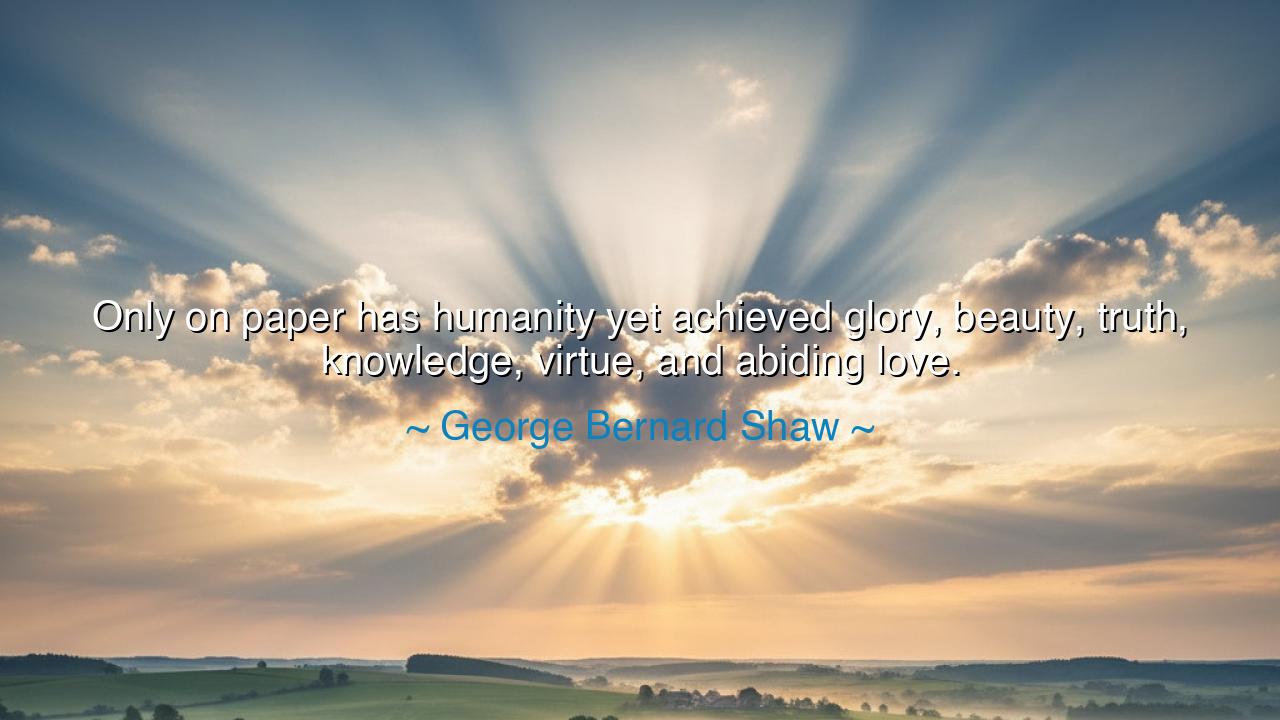
Only on paper has humanity yet achieved glory, beauty, truth
Only on paper has humanity yet achieved glory, beauty, truth, knowledge, virtue, and abiding love.






George Bernard Shaw, the fiery playwright and seer of human folly, declared with biting clarity: “Only on paper has humanity yet achieved glory, beauty, truth, knowledge, virtue, and abiding love.” In this line, Shaw pierces the heart of human vanity. He reminds us that mankind often adorns itself in lofty words, noble ideals, and sacred doctrines—but too often, these exist only in books, speeches, and proclamations. On the parchment of philosophy and scripture, one finds glory and virtue, yet in the marketplace of daily life, envy and selfishness reign. On the canvases of poets, love and truth shine eternal, yet in the struggles of nations, betrayal and bloodshed often prevail.
The origin of these words lies in Shaw’s relentless criticism of hypocrisy. Living through the turbulence of the late nineteenth and early twentieth centuries, he saw nations speak of knowledge yet embrace ignorance, proclaim virtue yet indulge in corruption, preach love yet wage merciless wars. Shaw, ever the satirist, used his pen to hold up a mirror before society. He saw that while humanity celebrated ideals on paper, it had not yet fully embodied them in action. His words are a challenge, not to despise the written word, but to rise and make its promises flesh.
History itself confirms his lament. Consider the French Revolution: the Declaration of the Rights of Man promised truth, liberty, and equality. Yet almost immediately, the guillotine bathed Paris in blood, and terror stalked the very streets that had cried for justice. The words on paper were glorious, but the lived reality was chaos and cruelty. Similarly, the Constitution of the United States proclaimed that all men were created equal, yet slavery persisted for nearly a century, and prejudice long after. The glory of ideals was written, but their practice lagged painfully behind.
And yet, Shaw’s words are not merely despairing. There is a subtle hope within them. For though humanity has not yet fully achieved beauty, truth, or love in life, the fact that it can dream them onto paper shows the seeds of possibility. The written word is a vision, a prophecy, a blueprint. It may not yet be reality, but it is the call toward which reality must move. Every page filled with ideals is an invitation to the human spirit: rise higher, live nobler, embody what you proclaim.
The deeper meaning is that ideals without action are shadows, but without ideals, action itself becomes blind. To write of virtue is not enough, but to never write of it at all would be to abandon it. Humanity must not rest satisfied with words alone, yet it must not despise words either, for they keep alive the vision of what might be. The tragedy is to stop at paper; the triumph is to make the ink of words into the blood of deeds.
The lesson for us is this: let us not boast of the ideals we can quote, the knowledge we have read, or the virtue we admire in theory. Instead, let us embody them in our daily lives. Let us turn the glory of written words into living actions. Do not speak of love—practice it. Do not write of truth—live by it. Do not admire virtue—discipline yourself to walk in it. In this way, what exists on paper will finally take root in the soil of life.
Practical action lies before us. Each time we read noble words, ask yourself: How can I live this? When you encounter a poem about love, act with compassion that day. When you read a law about justice, demand fairness in your community. When you encounter philosophy about truth, speak with honesty even when it costs you. Let us be translators of ideals, turning ink into action, paper into practice, dreams into reality.
Thus Shaw’s words echo like a trumpet through the ages: humanity has written glory, beauty, truth, knowledge, virtue, and love, but has yet to fully live them. Let this not be a curse upon us, but a summons. For the page has spoken; now the flesh must answer. Only then will the world not merely write of greatness, but dwell within it.






AAdministratorAdministrator
Welcome, honored guests. Please leave a comment, we will respond soon